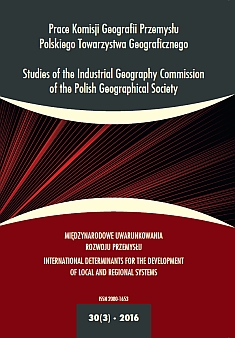Changes in the Structure of Industry in Poland in the Years 1990-2014 – Conditions and Trends
DOI:
https://doi.org/10.24917/20801653.303.9Keywords:
competitiveness, development, industry, innovation, structural changesAbstract
Abstract: The aim and the subject of the article is to present the role of change and transformation in the industrialstructure of economy in Poland. The publication is based on the available printed literature, statisticaldata, as well as on news netography. The article briefly explains the changes in the industrial developmentin Poland from the 1990s to the present day. The scale of the changes that have occurred was determined, andthe key areas of transformations that have taken place were discusses. The publication also includes informationon current tasks of industrial policy and on the challenges facing said policy due to the involvement in theEuropean Union structures. It also identifies the most innovative sectors of industry or companies that representthem. The size of investment in industry in Poland was compared to other European countries. Changesin the foreign trade were characterised. The data were illustrated with tables and graphs. The research methodused is the analysis of existing data and critical analysis of written sources. Based on the available literaturebook, netography and statistics, it becomes clear that in recent years there has been a significant changein the structure of industry in Poland. However, the actual process is not finished and will continue. Throughpresenting statistical data analysis and available materials relating to industrial policy, the author evaluatesthe changes that have occurred, and indicates possible directions of improving the current situation.Downloads
Metrics
References
Balcerowicz, L. (1997). Socjalizm–kapitalizm–transformacja. Szkice z przełomu epok. Warszawa: Wydawnictwo Naukowe PWN.
Chmiel, I. (1999). Problemy statystycznego pomiaru i analizy tendencji rozwojowych sektora prywatnych przedsiębiorstw w Polsce w latach 1990–1999. Raporty CASE, 24.
Domański, B. (2001). Kapitał zagraniczny w przemyśle Polski. Kraków: Instytut Geografii i Gospodarki Przestrzennej, Uniwersytet Jagielloński.
Domański, B. (2006). Polski przemysł na tle przemysłu Europy Środkowej i Wschodniej. Prace Komisji Geografii Przemysłu Polskiego Towarzystwa Geograficznego, 8, 27–36.
Główny Urząd Statystyczny (GUS) (2016, 3 stycznia). Pozyskano z http://stat.gov.pl/
Innovation Union Scoreboard 2015 (2016, 3 stycznia). Pozyskano z http://ec.europa.eu/growth/ industry/innovation/facts-figures/scoreboards_pl
Jaworska, M. (2007). Zmiany strukturalne w przemyśle państw OECD w latach 1993–2003. Wrocław: Wydawnictwo Akademii Ekonomicznej im. Oskara Langego.
Kałowski, A. Wysocki, J. (2012) (2016, 3 stycznia). Zmiany strukturalne w gospodarce polskiej. Warszawa: Oficyna Wydawnicza Szkoły Głównej Handlowej. Pozyskano z http://jmf.wzr. pl/pim/2012_1_2_24.pdf
Kamerton innowacyjności 2008 (2016, 3 stycznia). Pozyskano z http://www.infookno.pl/
Kamerton_Innowacyjnosci.html Karpiński, A. (2008). Przemiany strukturalne w procesie transformacji Polski 1989–2003–2025. Warszawa: Oficyna Wydawnicza Szkoły Głównej Handlowej.
Kilar, W. (2009). Zróżnicowanie potencjału ekonomicznego światowych korporacji informatycznych. Prace Komisji Geografii Przemysłu Polskiego Towarzystwa Geograficznego, 13, 110–121.
Klamut, M. (1996). Ewolucja struktury gospodarczej w krajach wysoko rozwiniętych. Wrocław: Wydawnictwo Akademii Ekonomicznej im. Oskara Langego.
Kołodko, G. (1999). Od szoku do terapii. Ekonomia i polityka transformacji. Warszawa: Poltext.
Konfederacja Lewiatan (2016, 3 stycznia). Konkurencyjność sektora MSP 2008. Pozyskano z http:// konfederacjalewiatan.pl/legislacja/wydawnictwa/_files/publikacje/raportMSP2008.pdf
Lisikiewicz, J., Olejnikowa, E.A. (red.) (1990). Zmiany strukturalne w rozwoju przemysłu. Warszawa: Wydawnictwo Szkoły Głównej Handlowej.
Ładysz, J. (2008). Polityka strukturalna Polski i Unii Europejskiej. Warszawa: PWN.
Macias, J. (2006). Zmiany strukturalne w przemyśle w Polsce. Ekonomika i Organizacja Przedsiębiorstwa, 7.
Mrozińska, A. (2015). Zmiany strukturalne w przemyśle przetwórczym według województw w latach 1999–2010. Prace Komisji Geografii Przemysłu Polskiego Towarzystwa Geograficznego, 21, 157–172.
Paszkowski, M. (1996). Zmiany strukturalne przemysłu. Metody, badania i tendencje światowe a transformacje w krajach Europy Środkowo-Wschodniej. Kraków: Wydawnictwo Uniwersytetu Jagiellońskiego.
PONTt Info – Gospodarka (2016, 3 stycznia). Pozyskano z http://baza.pontinfo.com.pl/
Rachwał, T. (2010). Struktura przestrzenna i działowa przemysłu Polski na tle Unii Europejskiej w dwudziestolecie rozpoczęcia procesów transformacji ustrojowej. Prace Komisji Geografii Przemysłu Polskiego Towarzystwa Geograficznego, 16, 105–124.
Rachwał, T. (2011). Wpływ kryzysu na zmiany produkcji przemysłowej w Polsce. Prace Komisji Geografii Przemysłu Polskiego Towarzystwa Geograficznego, 17, 99–113.
Stryjakiewicz, T. (1999). Adaptacja przestrzenna przemysłu w Polsce w warunkach transformacji. Poznań: Wydawnictwo Naukowe Uniwersytetu im. Adama Mickiewicza.
The 2010 EU Industrial R&D Investment Scoreboard (2016, 3 stycznia). Pozyskano z http://iri.jrc. ec.europa.eu/scoreboard10.html
Tkocz, M., (2001). Restrukturyzacja przemysłu regionu tradycyjnego. Katowice: Wydawnictwo Uniwersytetu Śląskiego.
Wieloński, A. (2004). Geografia przemysłu. Warszawa: PWN.
Woźniak, M.G. (2006). Strategiczne i instytucjonalne wyzwania dla Polski w kontekście globalizacji i regionalizacji. W: M.G. Woźniak (red.). Nierówności społeczne a wzrost gospodarczy. Problemy globalizacji i regionalizacji, cz. 2. Rzeszów: Katedra Teorii Ekonomii, Uniwersytet Rzeszowski, 9.
Zioło, Z. (2008). Ekonomiczne i społeczne uwarunkowania rozwoju gospodarki opartej na wiedzy. Przedsiębiorczość–Edukacja, 4, 12–23.
Zioło, Z. (2011). Wpływ światowego kryzysu na tempo wzrostu gospodarki i światowych korporacji. Prace Komisji Geografii Przemysłu Polskiego Towarzystwa Geograficznego, 17, 9–32.
Downloads
Published
How to Cite
Issue
Section
License
Articles are published under the terms of the Creative Commons License (CC BY-ND 4.0; Attribution– NoDerivs).

